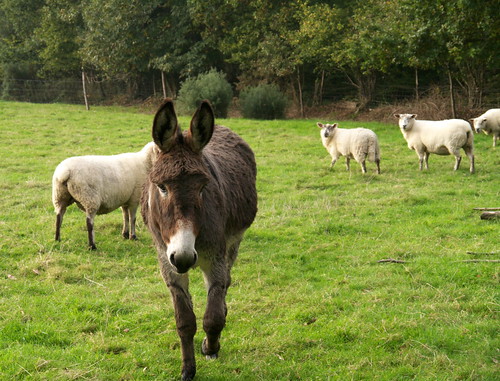Devilish German Sayings Posted by Constanze on Mar 29, 2017 in Culture, Language
Guten Tag! Today I’d like to share some German Redewendungen – sayings/expressions – with you. The German language has many expressions that contain the word der Teufel – devil. Some of these are the same in English, while others are completely different. Some are very straight-forward, while others are more imaginative! The prominence of this word in the German language most probably has a religious association, much in the same way that the word Gott (God) is used (‘O mein Gott’ – ‘Oh my God’ etc). There just seem to be more of these in German than there are in English. So, without further ado, here is a selection of German Redewendungen that use the word der Teufel!
Den Teufel an die Wand malen
To think the worst
Lit: ‘To paint the devil on the wall’
When we assume the worst of a situation, before anything has even happened, Germans say we paint the devil on the wall.
Wenn man den Teufel nennt
Speak of the devil
Lit: ‘When you name the devil’
Although this is identical to the English expression, there is another, much more imaginative Redewendung in German for the very same expression: ‘Wenn man vom Esel tratscht, kommt er gelatscht’ – ‘When you talk about the donkey, he comes strolling along’!

Wenn man vom Esel tratscht, kommt er gelatscht! – Speak of the devil! Foto: mindfrieze on flickr.com under a CC license (CC by S-A 2.0)
Was/wo/warum/wie zum Teufel?
What/where/why/how the devil?
A phrase identical to the English, but it’s worth noting that you can use it with was (what?), where (wo?), warum (why?) and wie (how?). Use it in the same way as you would in English: “Wo bist du?” = “Where are you?” and “Wo zum Teufel bist du?” = “Where the devil are you?”
In der Not frisst der Teufel Fliegen
Beggars can’t be choosers
Lit: ‘In an emergency, the devil will eat flies’
Another example where the German phrase mentions the devil but the English one doesn’t.
Der Teufel ist ein Eichhörnchen
The devil comes in many forms
Lit: ‘The devil is a squirrel’
Perhaps one of the most well-known of the bunch, this German, Teufel-related phrase isn’t suggesting that all squirrels are evil, but is a cautionary phrase telling us that the devil often comes disguised as something seemingly friendly and harmless – like a squirrel.

Just a cute little squirrel! … Or is it? Foto: thartz00 on flickr.com under a CC license (CC by S-A 2.0)
Gibt man dem Teufel den kleinen Finger, so nimmt er die ganze Hand
Give them an inch and they’ll take a mile
Lit: ‘Give the devil your little finger and he’ll take your whole hand’.
In Teufel’s Küche kommen
To get into deep water
Lit: ‘To be in the devil’s kitchen’. Meaning: To be in trouble/in a bad situation.
Seine Seele dem Teufel verkaufen
To sell your soul to the devil
Lit: ‘To sell your soul to the devil’
Geh zum Teufel
Go to hell
Lit: ‘Go to the devil’
As you can see, some are very straight-forward while others are a little more interesting. Do you know of any more Redewendungen that use the word or image of der Teufel – the devil? Let me know in the comments and I can add them to the post!
I’ll leave you with a devil-themed saying I came across earlier. See if you can figure out what it means. No cheating! I’ll give you a clue: It is about women. 😉
Translate this phrase!
“Wenn Frauen sich unterhalten, sitzt der Teufel in der Ecke und lernt.”
Bis bald,
Constanze

Build vocabulary, practice pronunciation, and more with Transparent Language Online. Available anytime, anywhere, on any device.





Comments:
Astrid:
When women converse, the Devil sits in the corner and learns!
Constanze:
@Astrid Precisely 😀 Nice work, Astrid
Pius:
Most appreciative